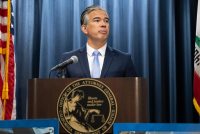Latest KFF Health News Stories
In PA County Jails, Guards Use Pepper Spray and Stun Guns to Subdue People in Mental Crisis
An investigation of records from 25 county jails across Pennsylvania showed that nearly 1 in 3 “use of force” incidents by guards involved a confined person who was having a psychiatric crisis or who had a known mental illness.
California Senate’s New Health Chair to Prioritize Mental Health and Homelessness
California state Sen. Susan Talamantes Eggman of Stockton has been appointed chair of the Senate’s influential health committee. A licensed social worker, Eggman said she will make mental health care and homelessness front-burner issues.
Readers and Tweeters Decry Medical Billing Errors, Price-Gouging, and Barriers to Benefits
KHN gives readers a chance to comment on a recent batch of stories.
After Election Win, California’s AG Turns to Investigating Hospital Algorithms for Racial Bias
Attorney General Rob Bonta handily won election on a progressive, social justice platform. He’s already begun with an inquiry into hospital software programs that might bake in racial discrimination.
Los mentores trabajan, sin límites, en la recuperación de adicciones
Los especialistas en apoyo a pares están ellos mismos en recuperación y se los contrata para ayudar a otros. Pueden vincularse con los pacientes de una manera distinta que los profesionales de salud.
The Player-Coaches of Addiction Recovery Work Without Boundaries
States, tribes, and local governments are figuring out how best to spend billions of dollars from an opioid lawsuit settlement. One option they’re considering is funding peer support specialists, who guide people recovering from addiction as they do it themselves.
Medicare Plan Finder Likely Won’t Note New $35 Cap on Out-of-Pocket Insulin Costs
In August, Congress approved a $35 cap on what seniors will pay for insulin, but that change came too late to add to the online tool that helps Medicare beneficiaries compare dozens of drug and medical plans. Federal officials say beneficiaries who use insulin will have the opportunity to switch plans after open enrollment ends Dec. 7.
El tema del aborto ayuda a los demócratas a minimizar pérdidas en estas elecciones
Entre otros problemas que enfrentaron los votantes el martes, los residentes de Dakota del Sur aprobaron una expansión de Medicaid bajo la Ley de Cuidado de Salud a Bajo Precio.
Abortion Issue Helps Limit Democrats’ Losses in Midterms
Although control of Congress was still undecided Wednesday, Republicans seemed poised to take power in the House, while the fate of the Senate remained too close to call. Economic issues were at the top of voters’ minds, but abortion access also played a large role in their decisions.
KHN’s ‘What the Health?’: ACA Open Enrollment Without the Drama
The Affordable Care Act’s 10th annual open-enrollment period began Nov. 1 and runs through Jan. 15, 2023, in most states. But for the first time, the health law seems to be enrolling Americans with far less controversy than in previous years. Meanwhile, as Election Day approaches, Democrats are focusing on GOP efforts to cut Social Security and Medicare. Joanne Kenen of the Johns Hopkins Bloomberg School of Public Health and Politico, Tami Luhby of CNN, and Julie Appleby of KHN join KHN’s Julie Rovner to discuss these topics and more. Also this week, Rovner interviews KHN’s Arthur Allen, who wrote the latest KNH-NPR Bill of the Month, about an old but still very expensive cancer drug.
Cash for Colonoscopies: Colorado Tries to Lower Health Costs Through Incentives
State employees could receive checks ranging from $50 to thousands of dollars if they choose the right provider.
“Cuarto trimestre”: período clave para prevenir las muertes maternas
La mayoría de las muertes maternas, hasta un 84%, podrían prevenirse, revela un nuevo análisis de los Centros para el Control y la Prevención de Enmfermedades.
‘Fourth Trimester’ Focus Is Pushed to Prevent Maternal Deaths
Public health investigators found that 53% of maternal deaths happened well after a mother left the hospital — from seven days to a year after the birth.
Journalists Talk Medicare and Public Health Infrastructure
KHN and California Healthline staff made the rounds on national and local media this week to discuss their stories. Here’s a collection of their appearances.
Readers and Tweeters Take Positions on Sleep Apnea Treatment
KHN gives readers a chance to comment on a recent batch of stories.
Labor Tries City-by-City Push in California for $25 Minimum Wage at Private Medical Facilities
Service Employees International Union-United Healthcare Workers West is testing the waters on a $25 minimum wage for support staff at health care facilities in Southern California. Opposition from hospitals and health facilities is driving an expensive battle.
KHN’s ‘What the Health?’: Looking Ahead to the Lame-Duck Session
Congress won’t be back in Washington until after Election Day, but lawmakers have left themselves a long list of items to finish up in November and December, including unfinished health care policies. Sandhya Raman of CQ Roll Call; Jessie Hellmann, also of CQ Roll Call; and Mary Agnes Carey of KHN join KHN’s Julie Rovner to discuss these topics and more. Also this week, Rovner interviews KHN’s Sam Whitehead, who reported and wrote the latest KHN-NPR “Bill of the Month” episode about a family who tried to use urgent care to save money, but ended up with a big emergency room bill anyway.
Readers and Tweeters Take a Close Look at Eye Care and White Mulberry Leaf
KHN gives readers a chance to comment on a recent batch of stories.
California Wants to Snip Costs for Vasectomies
Vasectomies can cost hundreds of dollars out-of-pocket — or more. State lawmakers are debating whether to make the procedure free to millions of men.
Readers and Tweeters Place Value on Community Services and Life-Sustaining Care
KHN gives readers a chance to comment on a recent batch of stories.



















